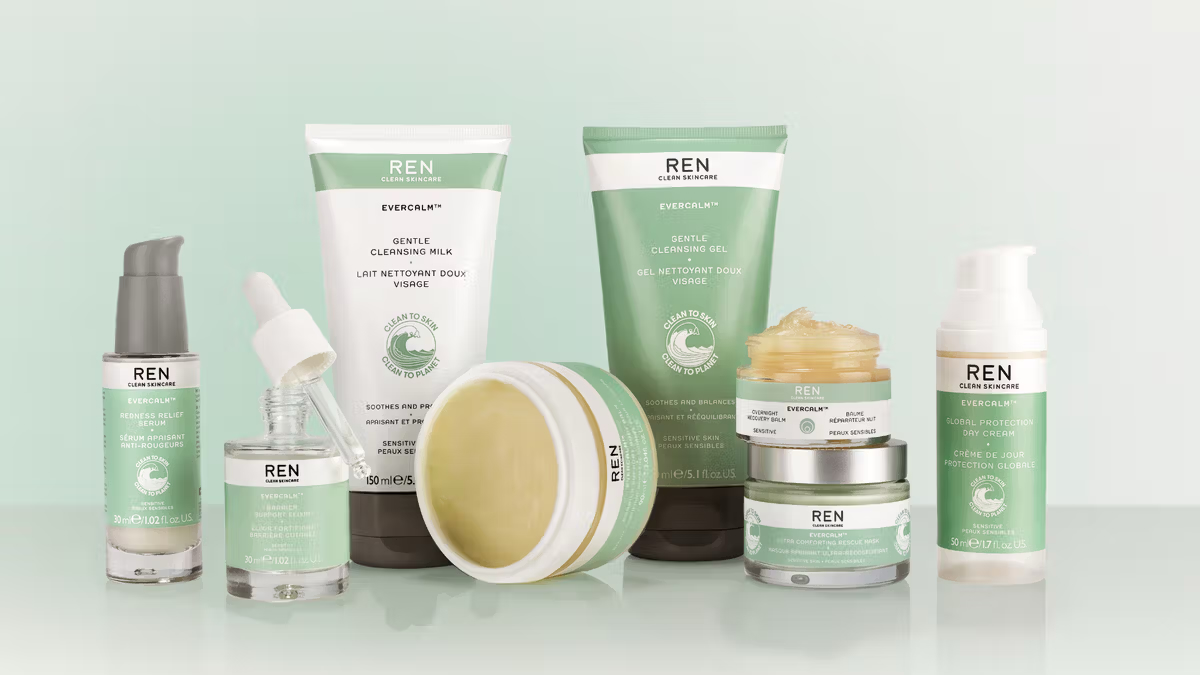
Why Unilever Closed Ren Clean Skincare Instead Of Selling It
On Thursday last week, Unilever announced it made the “difficult decision to begin formal steps to close the Ren business” by the end of the third quarter this year. The company said, “A combination of internal factors, compounded by market challenges in recent years has left the brand unable to sustain success in the long term.”
The decision comes after Unilever had put Ren, a natural and sustainable clean skincare pioneer founded in 2000 by Antony Buck and Robert Calcraft, who subsequently launched Cultured Biomecare, and sold to Unilever in 2015, a year before Goop entered the skincare space and clean beauty was thrust into the mainstream, under strategic review and failed to find a buyer for it, according to reporting by the publication Women’s Wear Daily.
Exploring the dynamics behind Unilever’s failure to divest Ren and its shuttering, for this edition of our ongoing series posing questions relevant to indie beauty, we asked seven investors and investment bankers the following questions: Why was Unilever unable to find a buyer for Ren? What does the move to close the brand convey about the current market for beauty brands? Are there any lessons up-and-coming brands should draw?
- Joel Palix Founder, Palix Unlimited
Ren was a true pioneer in natural and sustainable skincare also called clean beauty. A decade ago, it stood out on platforms like Feelunique in the U.K. for its distinct visual identity, clean yet effective formulations, reasonable price points and an authentic commitment to sustainability.
However, over the years, the brand lost its edge. A series of leadership changes and a lack of consistent strategic direction diluted Ren's identity. Under Unilever Prestige, a relatively small player in the consumer beauty space, Ren struggled to find a clear place, especially compared to Unilever’s more successful acquisitions like Dermalogica, which came with strong professional channel roots.
I am not sure whether Unilever seriously pursued a buyer. When a brand's annual revenues dip below $20 million and it stops being profitable, the cost and complexity of carving it out often outweigh the benefits, particularly for a large corporate group where the brand may be seen as a distraction rather than a strategic priority.
That said, with the right partner, turnarounds are possible. For instance, it will be interesting to watch whether Cospal, a new French company founded by the Lesieur family, can successfully revive Decléor, another once-iconic skincare brand that belonged to L’Oréal.
Ren’s closure offers a few critical lessons for the current beauty landscape:
Founders matter. Brands that lose their founders too early often struggle to maintain focus, passion and vision, especially when integrated too quickly into a larger corporate group. Palix Unlimited always advises strategic buyers to do phased acquisitions, keeping the founders involved. This is the plan with two recent transactions by Kresk, a French Group that owns SVR and Lazartigue, which acquired a small majority stake in Musc Intime, a fragranced femcare brand, and Novoma, a supplements brand.
“Natural” isn’t enough. Today’s consumers expect more than clean labels and pretty packaging. They demand efficacy, innovation, and visible results, especially in a market flooded with savvy indie brands and backed by hyper-informed buyers.
Strategic clarity is essential. Brands that shift direction too often risk losing their core audience. In a crowded market, founders usually know better how keep clarity of purpose.
- ODILE ROUJOL Founder, Fab Co-Creation Studio Ventures
I’m not sure corporations have the teams to sell some of their brands, especially major ones. This means that, when they fail to scale and stick to their profit expectations, they struggle.
This could change in the future, with more acquisitions and sales of brands that aren’t fits for their portfolios, with more transactions with private equity firms or other corporations, not waiting too long. Being fast to fail or succeed will enable the most adaptable corporations to gain significant market share while protecting or improving their EBITDA.
- Sam Kaplan Partner, Five Seasons Ventures
The failed Ren sale process and ultimate closure is indicative of the saturation of the market and the current priorities of the large beauty and personal care conglomerates.
Clean beauty is no longer innovative, but rather table stakes. Over the last 15 years—the post-social media age—we have seen cycles of increasingly faster beauty market evolution. From the rise of science-backed solutions in the early 2010s (Skinceuticals, etc.) to the burgeoning clean beauty movement of the late 2010s (when Ren was acquired and growing) to the merging of the two (doctor-led, clean-ish brands such as Barbara Sturm, Augustinus Bader, etc.). We have now entered the next age, biotech-led.
In short, what made Ren groundbreaking in the 2000s and still innovative in 2010s, has become the bare minimum, and Unilever failed to generate new reasons for customers to fall in love with the brand all over again.
In tandem with weakening customer appeal amidst a wildly and increasingly competitive market, Unilever Prestige is undergoing an aggressive portfolio consolidation strategy, not dissimilar to that undertaken by Shiseido and Henkel in the early 2020s. The beauty portfolios at the major conglomerates have grown significantly over the last decade through aggressive acquisition strategies, and now we are seeing these same buyers take stock of these assets and divest those that are not driving significant strategic value and financial returns.
For up-and-coming brands, it is ever important to continuously innovate and differentiate brand and product from the market, defining their raison d'être on an almost daily basis. Further, a focus on amassing a basket of ownable IP is critical. While this includes traditional IP (i.e., formulations), it also includes newer “IP” such as community and brand positioning. All this alongside strong financial performance, of course.
It has never been harder to be a challenger beauty brand. The M&A market has and will continue to be active, but the bar is higher for significant exits than ever before as the larger corporates look to reduce bloat.
- TINA BOU-SABA Investor
Given that Unilever has already sold a number of brands, including Suave, Q-tips, Caress, and others to Yellow Wood Partners, I assume that YWP had the opportunity to buy Ren and opted against it. Presumably other private equity firms did so as well.
I imagine that this stems from two fundamental issues. First, the business is likely relatively small. Simply lacking the scale that would motivate a PE firm or smaller strategic to get involved.
Second, the brand is stale, undifferentiated and lacks a real reason for being, in my opinion. Ren was an early innovator and leader in the "clean" skincare space, but it did not build a true brand identity beyond that initial positioning. It does not feel like there is much, if any, brand equity there anymore.
Given the business's small size, potential buyers likely concluded that the investment required to attempt to reinvigorate the brand was uneconomic, especially given how much more competitive the skincare space is today, compared to when Ren was acquired.
Indeed, beauty is a fiercely competitive industry, and customers today are less loyal than ever. Without strong brand DNA and a true community, it is virtually impossible to build a sustainable beauty business. And even the most successful brands are constantly innovating in order to maintain their top positions. Ren is perhaps a more extreme example of what happens when an early innovator does not evolve and does not create emotional connections with its consumers.
I am going to offer a somewhat cynical lesson for up-and-coming brands. If you have the opportunity to sell your business for what feels like a fair price, consider it very carefully. The stars have to align perfectly to execute a successful exit in the consumer brand world. Don't miss the window to sell. It may never open again.
Ren's founders sold their company to Unilever, an enormous accomplishment. Great for them! The fact that Unilever is shutting it down 10 years later says as much about the acquirer's priorities (fewer, bigger brands) and the broader market (fiercely competitive, "clean" is not a differentiator) as it does about the brand itself.
- Andrew Shore Beauty Brand Advisor And Former Managing Director, Moelis
The lesson is how hard it is for a small brand to survive under the tutelage of a huge company that is focused on growing not only its billion-dollar brands, but spending resources on getting its half-a-billion-dollar brands to a billion. It is hard for a small brand to get attention under the ownership of a large multinational, which is why many are shedding or closing down brands.
Sometimes multinationals will close down a brand and cross pollinate its technology across other brands in the parent’s portfolio as its doesn’t want to sell that technology to someone else. The perfect example would be Estée Lauder’s Prescriptives brand. Estée did not want to sell the technology to anyone else, but now uses some of Prescriptives technology on MAC and other color brands
- Rich Gersten Co-Founder and Managing Partner, True Beauty Ventures
Unilever’s decision to shutter Ren Clean Skincare after reportedly failing to sell the brand highlights the growing challenges faced by legacy niche brands in an increasingly saturated and competitive beauty landscape.
Ren, once a pioneer in clean beauty, struggled to maintain relevance as “clean” became the industry standard. Internal leadership changes, strategic portfolio streamlining and a broader slowdown in skincare all contributed to its decline. Despite early innovations, the brand failed to evolve or differentiate meaningfully in a market that now demands more—from technological advancement to deeper community engagement.
The closure underscores a critical truth: early-mover advantage fades fast. In today’s environment, scale, sustained growth and clear brand identity are essential. Ethical and sustainable credentials are now expected, not exceptional.
As conglomerates consolidate around top-performing “power brands,” the bar for acquisition—and survival—is higher than ever. Ren’s story is a stark reminder that, in a maturing market, brands must continually adapt to remain relevant.
Unilever’s inability to sell Ren and the subsequent closure reflect a more discerning, competitive and challenging beauty market. Brands, especially those in once-niche categories, must work harder than ever to prove their relevance scalability and differentiation to survive and thrive.
- Andrew Ross Senior Advisor and Venture Partner, XRC Ventures
Sometimes it's just time to close a brand. It is really hard and expensive to resuscitate a tired equity with negative momentum. “It works, and it's clean" is not sufficient to stand out in today's market.
If you have a question you'd like Beauty Independent to ask investors and investment bankers, please send it to editor@beautyindependent.com.





